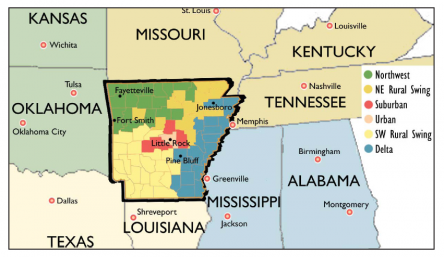By Jay Barth
Executive Summary
Because of the gains by conservatives in the state’s electoral environment since 2008, now is a crucial time that will shape the state’s politics for the next generation.
 Because portions of Arkansas are “like” different portions of the country, successful strategies for progressive social change employed in Arkansas could be applied to very different portions of the United States. This enhances the value of an investment in such efforts in Arkansas.
Because portions of Arkansas are “like” different portions of the country, successful strategies for progressive social change employed in Arkansas could be applied to very different portions of the United States. This enhances the value of an investment in such efforts in Arkansas.
A Record of Progress
In recent years Arkansas has made impressive progress on big challenges that have confounded leaders in other states. Under both Republican and Democratic leadership in the past decade, Arkansas has:
- Made a massive overhaul of its education system, including dramatically increased funding and enhanced educational standards;
- Avoided cutbacks to social safety net programs through raising revenue to fill budget shortfalls when necessary;
- Made the tax code more progressive for low-income families, while raising the minimum wage and passing other policies to expand economic opportunities for those in poverty;
- Largely avoided the divisive social issues of immigration, abortion, and LGBT-related policies that have dominated many other neighboring state agendas.
This document (Ripe for Reform) explores the factors creating Arkansas’s record of progress. The history of populism and progressivism in the state, especially compared to its Southern neighbors, serves as a foundation on which modern progressive social change can be built. Moreover, excepting some very recent dynamics that threaten the overall trend, modern electoral success by relatively progressive candidates and for progressive causes on ballot initiatives exemplifies the openness of the state’s citizenry to such ideals. The surprising success of progressive causes in the legislative arena in the state—despite limited outside support for that work—serves as additional evidence of the opportunities for lasting success in the state.
The report fleshes out this history and modern success stories. It also makes the case that the complex demography of the state that makes it both a “Southern” state and a “Midwestern” state means that political successes in Arkansas could be replicated in a wider array of states in those regions (and in rural America more broadly). In short, while many Southern states have become dominated by ideological polarization, Arkansas remains a more balanced political system that is, therefore, capable of progress on issues that will expand opportunities and social justice. Due to these unique characteristics, with additional investment from outside its borders, Arkansas has an enormous opportunity to continue tackling challenges of poverty and lack of opportunity to transform this small state and have broad ramifi cations beyond its borders.